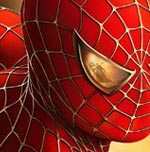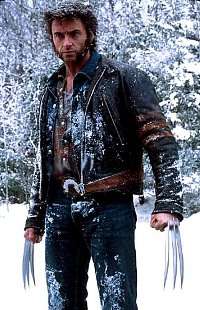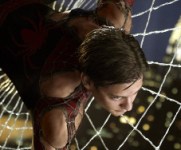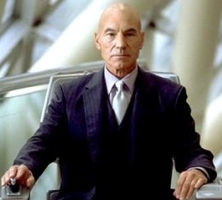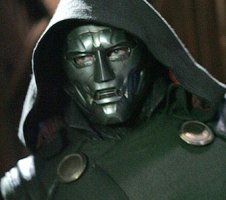|
| |
|
|
|
The X-Men are a unique, highly influential band of superheroes for many reasons. First of all, the fact their superpowers are derived from an evolutionary leap separates them from superheroes who are given their powers through divine or supernatural intervention. Their powers have a scientific explanation (the X-factor gene), and their genetic mutations turn them into “homo-superiors” that are outcasts from the rest of homo-sapien society (Trushell 3). The intervention of science in evolution has sentenced these humans to live in a world that fears and hates them because they are mutants with powers that cannot be controlled: “Those caught on the cusp of higher development are treated by the world with suspicion and distrust. They variously want to save the world or destroy it” (Graham).
Many of the mutants from the X-Men have a hard time dealing with the physical and social transition, and they have to accept the fact that they have a new role and identity in the world that is separate from non-mutants. For example, Ice Man in X 2: X-Men United struggles with confronting his family about his genetic mutation because he knows if he reveals himself, he will have to completely forfeit his old world and acknowledge his new identity. When he reveals himself to his parents, although they say they support him, he virtually has to leave them and form a new family: his school of X-Men superheroes. This struggle for many of the X-Men to cope with being social outcasts with superior human genes has led to different responses towards society. In the two current X-Men films, there exists a division between the mutants who have decided how to handle their mutations: the X-Men led by Professor Xavier use their powers to help humanity, and the mutants led by Magneto decide to destroy and dominate the humans who despise their existence so much. Although the X-Men have different views on how to deal with their fate of being alienated from society, they share the desire to be seen as more than just a threat to humanity and live their lives freely. The characters Dr. Xavier, Wolverine, and Magneto are prominent characters in the films because they embody three different ideologies of how people cope with isolation and discrimination: |
|
Professor Xavier
REAL NAME: Charles Xavier or Dr. X
ROLE: Professor, leader/mentor of The X-Men, and creator of Xavier Institute for Higher Learning
SUPER POWERS: Telepathy, detecting other mutants with machine Cerebro, controlling minds
LIMITATION: Wheelchair
IDEOLOGY: all mutants and humans coexisting peacefully. He created school for gifted children to protect mutants from persecution from rest of the world. His safe haven has allowed mutant children to be protected and educated, while adult mutants and his team of X-Men can reside to defend other mutants in need as well as humans from “bad mutants” |
“Dr. X” has the ideology that, in the X-Men films, many X-Men fight on a two-front battle. Xavier’s followers and students have to defeat hatred and oppression from humans as well as save humans from the threats made by Magneto’s mutants. Xavier sincerely want to portray a positive image of mutants to the rest of the world, and until then, he provides a home and education for them. Through peaceful means, Dr. X’s closest friend Jean Grey makes numerous political efforts to save mutants from having civil rights taken away or living in constant fear of being killed or imprisoned for no reason. The first X-Men film revolved around stopping Senator Kelly from passing legislation that highlights the dangers of mutants. X2 focuses on the mutants coming together to stop mutant-hater William Stryker from controlling mutants to attack humans, giving mutants bad press, and killing them off. The characters Stryker and Kelly are references to McCarthyism or Nazism because of their intolerance and hostility towards what they consider inferior beings. Dr. X’s character has been compared to Martin Luther King Jr. because, like Dr. King, he leads a movement to fight for the equality of a minority race (wikipedia.org). He adopts a “liberal political stance” that promotes the peaceful understanding of the needs of mutants (Trushell 4). Professor Xavier represents the ideal approach to solving problems with different racial groups. The X-Men themselves represent the ultimate minority not only with their genetic mutations, but their uniquely diverse superheroes; for example, Nightcrawler is German, Wolverine is Canadian, and Collosus was Russian (Trushell 4). An important attribute to his character is that no matter how oppressive humans treat mutants, he does not regard them as villains that must be destroyed. Instead, he realizes the reality taht mutants are misunderstood because humans cannot understand their powers nor see them as anything but inhuman. Dr. X says in X-Men: "Mankind isn't evil, just uninformed" (www.sciflicks.com). |
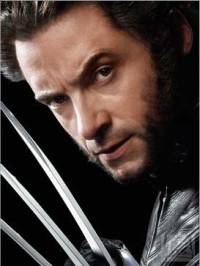
Photo courtesy of http://www.filmweb.no/filmnytt/article92568.ece
|
Wolverine
REAL NAME: James Howlett or “Logan”
ROLE: recruited member of the X-Men, helps Professor X fight against human oppression and violence towards mutants as well as “bad mutants” from attaching humans.
SUPER POWERS: animal reflexes and senses, three metal claws on each hand, super human strength, unbreakable skeletal structure, fast healing powers
Limitations: vague memory of his past
IDEOLOGY: Isolation from society. Wolverine is reluctant to take sides with either Dr. X or Magneto because his mutation has turned him into a beast, and he has a lot of animosity towards the world. He is originally used for a military experiment in Canada, but he escapes into the wilderness and resides as a loner (wikipedia.org).Within the X-Men group, Wolverine is often the strongest fighter who saves everyone with almost impossible odds, but he nevertheless clashes with many members because of his brute nature and attitude of apathy towards Dr. Xavier’s vision of mutant/human harmony. |
Wolverine is a complex character for the way he chooses to cope with his genetic mutation. Appropriate to his wolf-like genetic mutation, he isolates himself from both the human as well as mutant world. Wolverine is described as “a rugged antihero whose beliefs echoed antigovernment attitudes generated by the Vietnam War, Watergate, and the reaction against the rights revolution of the 1960s as an assault on individualism” (Trushell 5). He is a hero in a sense that he helps the X-Men escape from death and destroys whoever tries to cause harm to mutants. Most of his natural ability to swiftly kill and defeat great enemy mutants comes from his animal-like instincts, which derive from his genetic mutation. However, Wolverine’s primary concern is not human-mutant harmony. He has great animosity towards humans because his mutation has caused him forget who he really is and where he has come from. In X2, one of the primary reasons Wolverine decides to rejoin the X-Men movement against Magneto and Stryker is because has having nightmares of his past, and Stryker is a source of answers to his pining questions. Wolverine’s journey in defeating Stryker results in finding the location and origins, which proved to still haunt him because he discovers he was created by humans to be a killing monster. Wolverine, therefore, feels that humans contributed to making him so genetically different and alienated from the rest of the world. Nevertheless, his loyalty to Xavier, his protective relationship with Rogue, his love interest in Jean Grey, and his desire for the preservation of himself keeps Logan involved in the effort to bring equal rights to mutants. |
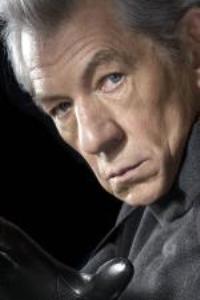
Photo courtesy of http://www.filmweb.no/
|
Magneto
REAL NAME: Erik Magnus Lehnsherr
ROLE: Antagonist of X-Men, leader of X-Men resistance against humans- try to cause destruction to humans
SUPER POWERS: magnetokinesis, or being able to shape magnetic fields and magnetic energy. He can also resist having his mind read by Professor X. He can control minds by controlling the iron in blood, so controls flow to the brain
LIMITATIONS: vulnerable to anything else except metal
IDEOLOGY: Anti-human. He does not believe that humans and mutants can coexist because sees mutations as genetic superiority and wants to eliminate inferior humanity. He refuses to see the chance of working with humans in a peaceful way and predicts that a war between mutant and human must be fought to see which species can live freely on the Earth. |
In contrast to Professor X, he can be compared to Malcon X. In X-Men, he creates machine that will convert many non-mutants to mutants in response to calls for persecution of mutants by Senator Kelly. He tries to turn UN leaders into mutants as well, unaware that his machine kills humans. In X-2, he tries to reverse Professor X’s Cerebro, which identifies all mutants, because it is originally being misused by Striker to eliminate mutants. He tries to reverse its effect by targeting all non-mutants and attempting to eliminate them from the earth. Magneto’s militant ideology contributes to humans’ misunderstanding and fear of mutants like the X-Men. His ultimate goal is to use his genetic mutation to counter-act the suppression done by humans with violence. Since Dr. X is compared to Martin Luther King, then Magneto can be compared to Malcolm X because they both want equality for their race, but his means of doing so are through destruction and revenge (Trushell 3). Magneto is so determined to achieve his goal and motivated by power that he attacks and uses other mutants who defend humans. Magneto uses retaliation as a way to cope with the consequences of being a mutant: “As Magneto, [Actor Ian] McKellen represents separatists- ‘anonymity is a mutant’s first defense against the world’s hostility’” (Graham 3). Magneto’s anti-peace approach has an appeal to X-Men such as Mystique and Pyro because they are allowed to take out their inner fury on fragile humans and publicize their powers to evoke public fear of them. In X-Men, his invention of a machine that turns humans into mutants futher shows how Magneto's motivation for causing havoc to innocent humans is because he believes all humans are responsible for the general xenophobia of the X-Men, so he wants humanity to suffer the same restrictions as he does. Also, unlike Dr. X, Magneto sees the effort to bring justice towards all species and the chance of communicating peacefully as a hopeless pursuit.
Important Quotations from X-Men the movie that address genetic mutations:
Prof. Charles Francis Xavier: "Mutation: it is the key to our evolution. It has enabled us to evolve from a single-celled organism into the dominant species on the planet. This process is slow, and normally taking thousands and thousands of years. But every few hundred millennia, evolution leaps forward."
Senator Robert Jefferson Kelly (R): I have here a list of names of identified mutants living right here in the United States. Here's a girl in Illinois who can walk through walls. Now what's to stop her from walking into a bank vault, or the White House, or [indicating the gallery] into their houses…and there are even rumors, Miss Grey, of mutants so powerful that they can enter our minds and control our thoughts, taking away our God-given free will. Now I think the American people deserve the right to decide if they want their children to be in school with mutants. To be taught by mutants! Ladies and gentlemen, the truth is that mutants are very real, and that they are among us. We must know who they are, and above all, what they can do!”
Dr. Jean Grey: Mutants are not the ones mankind should fear.
Senator Robert Jefferson Kelly (R): You're evading the real question. Three words: Are mutants dangerous?
Dr. Jean Grey: That's an unfair question, Senator, since the wrong person behind the wheel of a car can be dangerous.
Senator Robert Jefferson Kelly (R): That's why we license people to drive.
Dr. Jean Grey: But not to live.
Quotations from http://www.sciflicks.com/x-men/quotes.html
|
